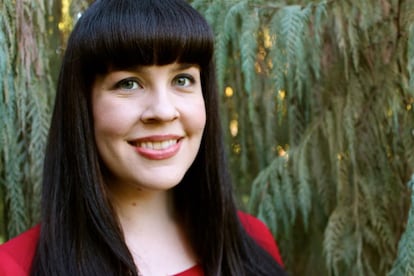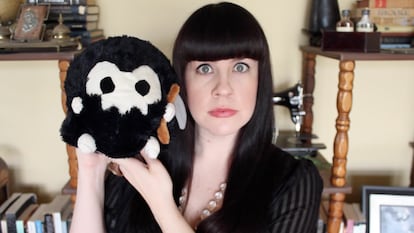Caitlin Doughty, writer and mortician: ‘Death is horrifying, but it’s also pretty funny’
The American, owner of a funeral home in Los Angeles, collected children’s questions about death in her new book ‘Will My Cat Eat My Eyeballs?’
When she was eight years old, Caitlin Doughty saw a child fall from a second story and hit the ground. She was whisked away, and never knew if the child died or was badly injured, but the idea of death began to haunt her, and never left her since. She now runs a funeral home in Los Angeles where she advocates for transparency in prices, defends the need for rituals, a humane treatment of families so they can spend the desired time with the body of their loved ones, and natural and sustainable ways of eliminating our physical waste. For example, composting our bodies to become part of nature’s cycle again. These views are also defended by the Order of the Good Death, of which she is a member.
Doughty makes a living from death and she lives with death. They don’t get along badly. She is also dedicated to educating people about it. In her 2017 book From Here to Eternity: Traveling the World to Find the Good Death, she explored cultural differences in dealing with our own mortality. Her new book, Will My Cat Eat My Eyeballs?, she collected and answered the questions about death that children ask her.
Question. Are children interested in death?
Answer. Yes, they are very interested, but we don’t allow them to ask, as if it were an adult thing. This helps them grow up with a fear of death. In high school I realized that fear was simply interest in disguise. We are tremendously interested in the things that produce our deepest fears.
Q. You bring a lot of humor to it.
A. We are on this massive planet and we don’t know why we’re here. There are theories, but we don’t truly understand why we’re here. We are these little animals that will eventually die and decompose. It’s horrifying, but at the same time, also very funny.

The children, in their candor, have asked her many things, and very strange ones. For example, if they will be able to keep their parents’ skulls when they die. Why, if we eat dead chickens, we don’t eat dead people. What corpses smell like. If their hair continues to grow afterwards. If there is a risk that, being in a coma, you will be buried alive by mistake. Or if it is possible to say goodbye to a grandmother like at they did at a Viking funeral. You know, the body in a boat at twilight, the parable of a flaming arrow that reaches the boat and sets it on fire. It’s lovely. But Doughty debunks the myth: it is practically impossible, no matter how much we have seen it in the movies, to set fire to a boat with a corpse inside.
Q. Is it weird to think about death too much?
A. It’s completely normal. It’s abnormal not to think about death. There are people, especially men, who boast: “I’m not concerned about it.” That’s where something’s wrong.
Q. Why?
A. Death is the great human condition. It is not a personal hobby, it is something that awaits us all. Especially after Covid and the realities of climate changes, with what is happening in Gaza or Ukraine, we are constantly bombarded with reminders of our own mortality. But we are not preparing our children to live in this world.
At her funeral home, Doughty is constantly in touch with this big issue. She has seen former Hollywood stars, rocket scientists, homeless people coming in. People from every economic level and ethnic background. She says she has learned a lot from that. She thinks that since death became “professionalized” there is very little time left for relatives to say goodbye, and that it is important to spend time with the corpse, as long as necessary, without being rushed.

Q. You are opposed to the things that are sometimes done to corpses.
A. Yes. Many times the body is made up too much, or gets full of chemicals, in a very artificial way. She’s your grandmother, yes, but she hardly looks like it anymore.
Q. So, our relationship with death should be closer.
A. Imagine you have a friend from college who you only call every 10 years. The relationship weakens. But maybe you have another friend who you see every week, your relationship there is stronger. This is how we should deal with death. Our friendship would be better.
In her previous book she compiled customs from cultures that are more friendly to death than the West. Of course, there is Mexico, which has its colorful Day of the Dead. But she also explored rural areas of Indonesia, where she saw how a grandfather’s body, mummified and dressed, spent several years in the family home. Or Tokyo, where she witnessed the kotsuage ceremony, in which relatives extract bones from the ashes of the deceased with the help of chopsticks. Or La Paz, where he meets the so-called Bolivian ñatitas, those human skulls in which, every November 8, cigarettes are placed, in a way that is somewhere between comical and macabre, and grant wishes to those who make a wish.
Q. How would you like to die?
A. First of all, peacefully. Let people come, tell stories, talk, cry. Let there be no chemicals, let them put me in a hole and my body decomposes.
That is another of Doughty’s positions: to reach another type of immortality, not the one suggested by religions, whose withdrawal leaves us “floating in an empty space,” but one related to nature. Knowing that your atoms and molecules will become part of the soil and the cycle of life.
Q. Do you want to be part of a tree, for example?
A. For me that is meaningful, not in a religious way, but I also don’t like the nihilism of thinking that after death nothing matters. Because it does matter.
By the way, in response to the question in the title of her latest book about whether the cat will end up eating one’s eyes: the answer is no… at least not at first. But if the sweet kitten is locked up with my corpse and starts to get hungry, it will end up eating soft and exposed parts, like the mouth or nose. In that case, it may bite the eyeballs.
Sign up for our weekly newsletter to get more English-language news coverage from EL PAÍS USA Edition
Tu suscripción se está usando en otro dispositivo
¿Quieres añadir otro usuario a tu suscripción?
Si continúas leyendo en este dispositivo, no se podrá leer en el otro.
FlechaTu suscripción se está usando en otro dispositivo y solo puedes acceder a EL PAÍS desde un dispositivo a la vez.
Si quieres compartir tu cuenta, cambia tu suscripción a la modalidad Premium, así podrás añadir otro usuario. Cada uno accederá con su propia cuenta de email, lo que os permitirá personalizar vuestra experiencia en EL PAÍS.
¿Tienes una suscripción de empresa? Accede aquí para contratar más cuentas.
En el caso de no saber quién está usando tu cuenta, te recomendamos cambiar tu contraseña aquí.
Si decides continuar compartiendo tu cuenta, este mensaje se mostrará en tu dispositivo y en el de la otra persona que está usando tu cuenta de forma indefinida, afectando a tu experiencia de lectura. Puedes consultar aquí los términos y condiciones de la suscripción digital.








































